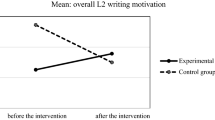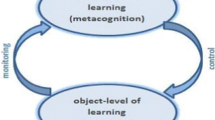Abstract
The goal of this research was to highlight the role social regulatory processes play in making students’ teamwork in reciprocal teaching (RT) groups (a classroom activity in which students take the teacher’s role in small group reading sessions) effective. In addition to teamwork quality, we expected peer feedback to be a key factor in enhancing students’ reading comprehension achievements. Because previous research (Schünemann et al. in Contemp Educ Psychol 38:289–305, 2013) has shown that procedures of self-regulated learning (SRL) augment the effects of RT methods, we further assumed that such procedures would promote the quality of students’ collaborative efforts. In a cluster-randomized trial, students in 12 fifth-grade classes practiced a strategic approach to reading either in a RT condition or in a RT + SRL condition. In one of the 14 sessions, students’ interactive behavior was videotaped. Strategy use and reading comprehension were assessed at pretest, posttest, and maintenance. Performance differences between conditions were reliable only at maintenance. A multilevel mediation analysis showed that relative to RT students, RT + SRL students were better able to provide their teammates with informative feedback and organize their group work in a task-focused manner. Only feedback quality mediated the sustainability of treatment effects on strategy use and reading comprehension. In essence, this research suggests that effective reading comprehension trainings should integrate explicit instruction and practice in reading strategies, SRL, and focus on supportive peer processes in small groups with extensive instruction and practice in peer feedback.


Similar content being viewed by others
References
Andreassen, R., & Bråten, I. (2011). Implementation and effects of explicit reading comprehension instruction in fifth-grade classrooms. Learning and Instruction, 21, 520–537.
Azevedo, R., & Hadwin, A. F. (2005). Scaffolding self-regulated learning and metacognition—Implications for the design of computer-based scaffolds. Instructional Science, 33, 367–379.
Bauer, D. J. (2003). Estimating multilevel linear models as structural equation models. Journal of Educational and Behavioral Statistics, 28, 135–167.
Block, C. C., & Duffy, G. G. (2008). Research on teaching comprehension. Where we’ve been and where we’re going. In C. C. Block & S. R. Parris (Eds.), Comprehension instruction. Research-based best practices (2nd ed., pp. 19–37). New York: Guilford Press.
Butler, D. L., & Winne, P. H. (1995). Feedback and self-regulated learning: A theoretical synthesis. Review of Educational Research, 65, 245–281.
Cohen, E. G. (1994). Restructuring the classroom: Conditions for productive small groups. Review of Educational Research, 64, 1–35.
De Backer, L., Van Keer, H., & Valcke, M. (2015). Exploring evolutions in reciprocal peer tutoring groups’ socially shared metacognitive regulation and identifying its metacognitive correlates. Learning & Instruction, 38, 63–78.
De Corte, E., Mason, L., Depaepe, F., & Verschaffel, L. (2011). Self-regulation of mathematical knowledge and skills. In B. J. Zimmerman & D. H. Schunk (Eds.), Handbook of self-regulation of learning and performance (pp. 155–172). New York: Routledge.
Dignath, C., Buettner, G., & Langfeldt, H.-P. (2008). How can primary school students learn self-regulated learning strategies most effectively? A meta-analysis on self-regulation training programmes. Educational Research Review, 3, 101–129.
Dole, J. A., Nokes, J. D., & Drits, D. (2009). Cognitive strategy instruction. In S. E. Israel & G. G. Duffy (Eds.), Handbook of research on reading comprehension (pp. 347–372). New York: Routledge.
Fairchild, A. J., & MacKinnon, D. P. (2009). A general model for testing mediation and moderation effects. Prevention Science, 10, 87–99.
Gibbs, G., & Simpson, C. (2004). Conditions under which assessment supports students’ learning. Learning and Teaching in Higher Education, 1, 3–31.
Graesser, A. C. (2007). An introduction to strategic reading comprehension. In D. S. McNamara (Ed.), Reading comprehension strategies (pp. 3–26). New York: Erlbaum.
Graham, S., Harris, K. H., & Zito, J. (2005). Promoting internal and external validity: A synergism of laboratory-like experiments and classroom-based self-regulated strategy development research. In G. D. Phye, D. H. Robinson, & J. R. Levin (Eds.), Educational psychology series. Empirical methods for evaluating educational interventions (pp. 235–265). San Diego, CA: Elsevier Academic Press.
Hadwin, A. F., Järvelä, S., & Miller, M. (2011). Self-regulated, co-regulated, and socially shared regulation of learning. In B. J. Zimmerman & D. H. Schunk (Eds.), Handbook of self-regulation of learning and performance (pp. 65–84). New York: Routledge.
Hadwin, A. F., Wozney, L., & Pontin, O. (2005). Scaffolding the appropriation of self-regulatory activity: A socio-cultural analysis of changes in teacher–student discourse about a graduate research portfolio. Instructional Science, 33, 413–450.
Hart, E. R., & Speece, D. L. (1998). Reciprocal teaching goes to college: Effects for postsecondary students at risk for academic failure. Journal of Educational Psychology, 90, 670–681.
Hattie, J. (2009). Visible learning: A synthesis of over 800 meta-analyses relating to achievement. London; New York: Routledge.
Hattie, J., & Timperley, H. (2007). The power of feedback. Review of Educational Research, 77, 81–112.
Hoegl, M., & Gemuenden, H. G. (2001). Teamwork quality and the success of innovative projects: A theoretical concept and empirical evidence. Organizational Science, 12, 435–449.
Hu, L., & Bentler, P. M. (1999). Cutoff criteria for fit indexes in covariance structure analysis: Conventional criteria versus new alternatives. Structural Equation Modeling: A Multidisciplinary Journal, 6, 1–55.
Iiskala, T., Vauras, M., Lehtinen, E., & Salonen, P. (2011). Socially shared metacognition of dyads of pupils in collaborative mathematical problem-solving processes. Learning & Instruction, 21, 379–393.
Johnson, D. W., & Johnson, R. T. (1999). Making cooperative learning work. Theory Into Practice, 38, 67–73.
Kazdin, A. E. (2007). Mediators and mechanisms of change in psychotherapy research. Annual Review of Clinical Psychology, 3, 1–27.
Khosa, D. K., & Volet, S. E. (2014). Productive group engagement in cognitive activity and metacognitive regulation during collaborative learning. can it explain differences in students’ conceptual understanding? Metacognition & Learning, 9, 287–307.
Kluger, A. N., & DeNisi, A. (1996). The effects of feedback interventions on performance: A historical review, a meta-analysis, and a preliminary feedback intervention theory. Psychological Bulletin, 119, 254–284.
Krull, J. L., & MacKinnon, D. P. (2001). Multilevel modeling of individual and group level mediated effects. Multivariate Behavioral Research, 36, 249–277.
Little, R. J. A. (1988). A test of missing completely at random for multivariate data with missing values. Journal of the American Statistical Association, 83, 1198–1202.
Moreno, R. (2004). Decreasing cognitive load for novice students: Effects of explanatory versus corrective feedback in discovery-based multimedia. Instructional Science, 32, 99–113.
Mory, E. H. (2004). Feedback research revisited. In D. H. Jonassen & M. P. Driscoll (Eds.), Aect. handbook of research for educational communications and technology. A project of the association for educational communications and technology (2nd ed., pp. 745–783). Mahwah, NJ: Lawrence Erlbaum Associates.
Muthén, L. K., & Muthén, B. O. (1998-2015). Mplus user’s guide: Statistical analysis with latent variables (7th ed.). Los Angeles, CA: Muthén & Muthén.
O’Donnell, A. M. (2006). The role of peers and group learning. In P. A. Alexander & P. H. Winne (Eds.), Handbook of educational psychology (pp. 781–802). Mahwah, NJ: Lawrence Erlbaum Associates.
Palincsar, A. S., & Brown, A. L. (1984). Reciprocal teaching of comprehension-fostering and comprehension-monitoring activities. Cognition and Instruction, 1, 117–175.
Panadero, E., & Järvelä, S. (2015). Socially shared regulation of learning. A review. Educational Psychologist, 20, 190–203.
Panadero, E., Kirschner, P. A., Järvelä, S., Malmberg, J., & Järvenoja, H. (2015). How individual self-regulation affects group regulation and performance: A shared regulation intervention. Small Group Research, 46, 431–454.
Parr, J. M., & Townsend, M. A. R. (2002). Environments, processes, and mechanisms in peer learning. International Journal of Educational Research, 37, 403–423.
Pintrich, P. (2000). The role of goal orientation in self-regulated learning. In M. Boekaerts, P. Pintrich, & M. Zeidner (Eds.), Handbook of self-regulation (pp. 452–501). San Diego, CA: Academic Press.
Pituch, K. A., Stapleton, L. M., & Kang, J. Y. (2006). A comparison of single sample and bootstrap methods to assess mediation in cluster randomized trials. Multivariate Behavioral Research, 41, 367–400.
Preacher, K. J., Zyphur, M. J., & Zhang, Z. (2010). A general multilevel SEM framework for assessing multilevel mediation. Psychological Methods, 15, 209–233.
Rogat, T. K., & Linnenbrink-Garcia, L. (2011). Socially shared regulation in collaborative groups: An analysis of the interplay between quality of social regulation and group processes. Cognition and Instruction, 29, 375–415.
Rosenshine, B., & Meister, C. (1994). Reciprocal teaching: A review of the research. Review of Educational Research, 64, 479–530.
Schünemann, N., Spörer, N., & Brunstein, J. C. (2013). Integrating self-regulation in whole-class reciprocal teaching: An analysis of incremental effects on fifth graders’ reading comprehension, reading strategies and self-efficacy for reading. Contemporary Educational Psychology, 38, 289–305.
Schunk, D. H., & Zimmerman, B. J. (2007). Influencing children’s self-efficacy and self-regulation of reading and writing through modeling. Reading & Writing Quarterly, 23, 7–25.
Shute, V. J. (2008). Focus on formative feedback. Review of Educational Research, 78, 153–189.
Souvignier, E., Trenk-Hinterberger, I., Adam-Schwebe, S., & Gold, A. (2008). Frankfurter Leseverständnistest (FLVT 5-6). Göttingen: Hogrefe.
Spörer, N., & Brunstein, J. C. (2009). Fostering the reading comprehension of secondary school students through peer-assisted learning: Effects on strategy knowledge, strategy use, and task performance. Contemporary Educational Psychology, 34, 289–297.
Spörer, N., & Schünemann, N. (2014). Improvements of self-regulation procedures for fifth graders’ reading competence: Analyzing effects on reading comprehension, reading strategy performance, and motivation for reading. Learning & Instruction, 33, 147–157.
Topping, K. (1998). Peer assessment between students in colleges and universities. Review of Educational Research, 68, 249–276.
Volet, S., Summers, M., & Thurman, J. (2009a). High-level co-regulation in collaborative learning: How does it emerge and how is it sustained? Learning and Instruction, 19, 128–143.
Volet, S., Vauras, M., & Salonen, P. (2009b). Self- and social regulation in learning contexts: An integrative perspective. Educational Psychologist, 44, 215–226.
Webb, N. M. (2010). Peer learning in the classroom. In P. L. Peterson, E. L. Baker, & B. McGaw (Eds.), International encyclopedia of education (3rd ed., pp. 636–642). Oxford: Academic Press.
Webb, N. M., & Mastergeorge, A. (2003). Promoting effective helping behavior in peer-directed groups. International Journal of Educational Research, 39, 73–97.
Zimmerman, B. J. (2000). Attaining self-regulation: A social cognitive perspective. In M. Boekaerts, P. R. Pintrich, & M. Zeidner (Eds.), Handbook of self-regulation (pp. 13–39). San Diego, CA: Academic Press.
Acknowledgments
This research was funded by German Science Foundation Grant SP 1269/1-1 to Nadine Spörer and Joachim C. Brunstein. The work presented herein was conducted in partial fulfillment of Nina Schünemann’s dissertation at the University of Giessen.
Author information
Authors and Affiliations
Corresponding author
Appendix
Appendix

Rights and permissions
About this article
Cite this article
Schünemann, N., Spörer, N., Völlinger, V.A. et al. Peer feedback mediates the impact of self-regulation procedures on strategy use and reading comprehension in reciprocal teaching groups. Instr Sci 45, 395–415 (2017). https://doi.org/10.1007/s11251-017-9409-1
Received:
Accepted:
Published:
Issue Date:
DOI: https://doi.org/10.1007/s11251-017-9409-1




